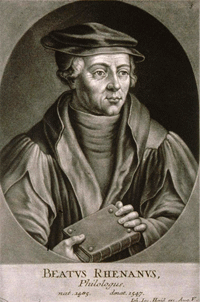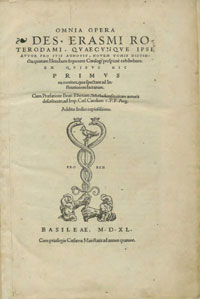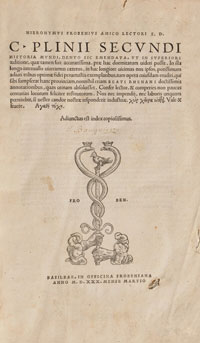



Beatus Rhenanus (Beat Bild)
Sélestat 1485 - Strasbourg 1547
Philologist, he received an aristocratic title from Charles V in 1523. His texts and translations were admired across Europe. He studied at the famous Latin School of Sélestat, under the guidance of teachers such as Crato Hofmann and Hieronymus Gebwiler. After working there for three years, he left Sélestat in order to study in Paris, where he obtained his bachelor's degree and the diplômes de Licencié et de Maître dès Arts. During his university years, he collected notebooks, which remain among the most valuable sources of information on the teaching systems of his time. During the period of his studies, he also worked at the printing shop of Estienne as a proofreader, and enlarged his personal library. Beatus bought his first books when he was only 15 years old, and by the time he was 22 he already possessed 253 volumes. Coming home in 1507, he continued to study and work in the editorial worlds of Strasbourg and Basel, where he attended the lectures on Greek language by Kuhn (or Cono). He collaborated on a number of publications at the Froben press in Basel.).
He worked with Lefèvre d’Etaples on an edition of Aristotle. He also published neo-latin texts, such as the works by his professor at the Sorbonne Fauste Andrelin. He edited the editiones principes of works by Velleius Paterculus and Tertullian. He also re-edited works by Pliny, Livy, the History of Goths by Procopius, Maxim of Tyre, the Historia Ecclesiastica, and the correspondance of Erasmus. He also authored the first biographies of Geiler of Kayserberg, and of Erasmus, who was his personal friend. In 1531, he published his most important work, a history of Germany, which was reprinted in 1551 with a biography of Beatus by Jean Sturm.
Bibliography: P. Adam, L'Humanisme à Sélestat : l'Ecole, les humanistes, la bibliothèque, Sélestat, Imprimerie Alsatia 1978; J.F. D'Amico, Theory and Practice in Renaissance Textual Criticism : Beatus Rhenanus Between Conjecture and History, Berkeley, University of California Press 1988; E Faye, Beatus Rhenanus lecteur et étudiant de Charles de Bovelles, in «Annuaire des Amis de la Bibliothèque Humaniste de Sélestat» (=AABS), 45 (1995), pp. 119-138; F. Hieronymus, Beatus Rhenanus und das Buch : biblio-biographische Flickstücke, AABS, 36 (1986), pp. 63-114; J. Hirstein, Beatus Rhenanus et les 'Avis au lecteur' signés 'Jean Froben' sur l'Histoire d'Ammien Marcellin et sur l'Histoire Auguste dans l'édition bâloise de juin 1518, AABS, 39 (1989), pp. 27-50; Idem, Tacitus' Germania and Beatus Rhenanus (1485-1547), Frankfurt, Peter Lang 1995; Idem, La bibliothèque de Beatus Rhenanus: une vue d'ensemble des livres imprimés, in R. De Smet (ed.), Les humanistes et leur bibliothèques, Paris, Peeters 2002, pp. 113-142; N. Holzberg, Beatus Rhenanus (1485-1547) : Eine biographisch-forschungsgeschichtliche Bestandsaufnahme, AABS, 35 (1985), pp. 19-32; A. Horawitz, K. Hartfelder (edd.), Briefwechsel des Beatus Rhenanus, Leipzig, Teubner 1886; G.C. Knod, Briefwechsel des Beatus Rhenanus, in «Centralblatt für Bibliothekswesen», 4 (1887), pp. 305-315; H. Meyer, Propos sur la bibliothèque de Beatus Rhenanus, AABS, 35 (1985), pp. 85-96; U. Muhlack, Beatus Rhenanus (1485-1547). Vom Humanismus zur Philologie, in Humanismus im deutschen Südwesten: Biographische Profile, Sigmaringen, Jan Thorbecke Verlag 1993, pp. 195-220; S. Musial, Beatus Rhenanus étudiant de philosophie à Paris (1503-1507), AABS, 35 (1985), pp. 271-279; P. Petitmengin, Les Livres de Beatus Rhenanus, in Histoire des bibliothèques françaises, Paris, Promodis 1989, pp. 298-301; Idem, Beatus Rhenanus et les manuscrits latins, AABS, 35 (1985). 235-246; L.D. Reynolds (ed.), Texts and Transmission : A Survey of the Latin Classics, Oxford, Clarendon 1986; E.F. Jr. Rice, The Prefatory Epistles of Jacques Lefèvre d'Etaples and related texts, N.Y., Columbia Univ. Press 1972; M. Sicherl, Johannes Cuno. Ein Wegbereiter des Griechischen in Deutschland: Eine biographisch-kodikologische Studie, Heidelberg, Carl Winter Universitätsverlag 1978; I. Suzeau, Un Extrait inédit du cahier d'écolier de Beatus Rhenanus, AABS, 41 (1991), pp. 101-118; R. Walter, Beatus Rhenanus citoyen de Sélestat, ami d'Erasme : anthologie de sa correspondance, Strasbourg, Oberlin 1986.